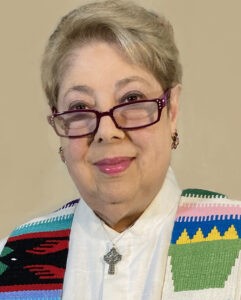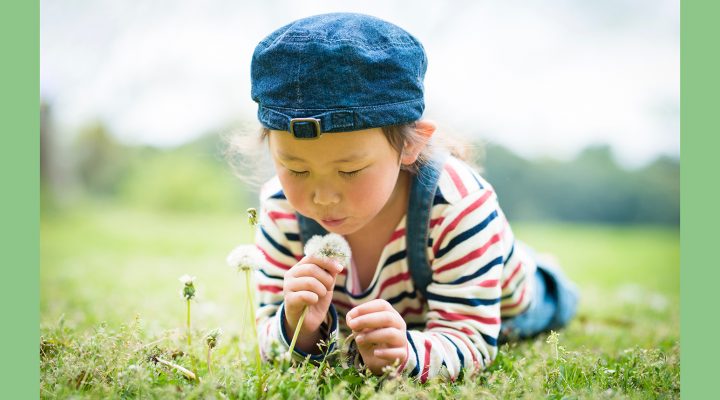I received my earliest biblical and ecclesiastical knowledge in the Greek Orthodox Church, the church of my childhood. If I learned to experience wonder at all, I learned it there.
Of course, experiencing earthly wonder included consuming huge feasts of lamb and tzatziki sauce, dancing to the music of Greek bands and attending dozens of lavish “big fat Greek weddings.”
Experiencing wonder also included holy things I didn’t quite understand. I was constantly astounded by the rhythms of the worshipping congregation, the sweet aroma of incense, the barely audible flickering of candles, the ethereal icon that perfectly covered the entire ceiling of the church’s dome — the highest point of the church — always pointing toward the heavens.

Kathy Manis Findley
I am grateful I sensed wonder from the time I felt water in church, a full immersion in a large, ornate vessel. In receiving that sacrament, I was instantly a Greek Orthodox infant.
I added to that the wonder I experienced in the next part of my spiritual growth — in the Baptist church, with wonder not quite as astonishing to me as it had been before, but still its own wonder.
In the years to come, I would be “baptized” again into sacred Baptist things and experience wonder in singing the old hymns of the church and hearing the prayers of intercession for the people. Even singing “Just As I Am,” ploddingly but with expectation that someone would come down the aisle.
In between those two church traditions, there is wonder everywhere in lush green valleys, majestic mountains, oceans and deserts, trees and wildflowers, stunning sunrises and night skies filled with a thousand stars. In these gifts of nature, any of us can experience immeasurable wonder.
Instead, we are sometimes pushed into melancholy by life circumstances that include grief, loss, fear, despair and other soul-harming emotions that leave us with a sense of emptiness and the absence of wonder.
Rabbi Abraham Joshua Heschel was a Jewish theologian and philosopher. His life led him through places impure and holy. Melancholy covered him. His mother died at the hands of the Nazis. Two of his sisters died in a Nazi concentration camp and another sister was killed in a German bombing.
Yet Rabbi Heschel had a social consciousness that was stronger than the melancholy. It led him to march with Martin Luther King Jr. in the Selma Civil Rights march. Rabbi Heschel later wrote, “When I marched in Selma, my feet were praying.” For him, being found in impure places of injustice was an encounter with wonder and his personal awareness of the divine.
“Awareness of the divine begins with wonder.”
He wrote these words: “Awareness of the divine begins with wonder.”
These days, I am a part of a wonderful Baptist church. I have worshiped in the beautiful sanctuary many times. Some of those times of worship were wonder for me, sometimes not. That makes me ponder how it is that people of faith could experience an “awareness of the divine” every once in a while. What makes the difference in whether or not a person experiences wonder? Why are there hundreds of hindrances to such sacred awareness? How do individuals become mired in melancholy even when wonder is all around?
I promised myself I would not try to answer those questions by making a list of answers with bullet points. If you and I looked back at the last couple of years, we would remember the destruction of a global pandemic, mass shootings in schools, murders and protests in the streets, political dysfunction, division and rancor, new attacks on women’s rights, the real and present danger of climate change, biodiversity loss, contaminated water and more. We would undoubtably hear current and alarming reports that Texas state troopers — working under Gov. Greg Abbott’s multi-billion-dollar anti-immigrant initiative — have been instructed to push young children and nursing mothers into the Rio Grande. On top of that, all of us suffer personal life circumstances that can bring us to our knees.
No wonder there’s no wonder!
Aren’t those painful circumstances and events enough to cause us melancholy? No doubt, persistent, chronic melancholy can block our awareness of the divine. I know this to be true.
There are many and varied reasons any person might suffer melancholy. Throughout my ministry, I learned a great deal about the reasons — physical reasons and emotional ones — from imprisoned women who were in my support groups. I watched the women gradually sinking into melancholy, perhaps because they were living in the absence of an awareness of the divine.
Yet, as I listened to the stories they told and watched their tears that fell so easily, I observed that most of them had known a sense of wonder in their lives, at least once in a while. Most of them also experienced wonder in their places of worship. Wonder might have appeared to them in a thunderstorm, a magnolia leaf or a thousand stars lighting up a dark sky.
“The hardship of incarceration taught them that without the ability to be aware of the divine, their souls suffered.”
I describe many of those women as persons who rise above their prisons, depend upon a deep sense of the spiritual and live with an awareness of the divine. The hardship of incarceration taught them that without the ability to be aware of the divine, their souls suffered.
I could describe the ways my soul has suffered through the past several years and the circumstances that robbed my wonder. Embodying an “awareness in divine” has been a formidable life task for me.
Melancholy started for me with sudden end-stage kidney disease, dialysis and, later, a kidney transplant. I could not seem to regain my sense of wonder after my experience with illness.
Here’s the wise and urgent message in all these words: Post-pandemic — or post personal life pandemic — the church must work harder to create for worshippers “an awareness of the divine that begins with wonder.” That means finding ways to create wonder that might be done in a number of ways — heartfelt music and hymns the people love, moments of quiet holiness, prayers that are full of compassion and comfort, assurance of God’s presence in melancholy times.
Last week, I was talking with a person who recently left her church. Becky (not her real name) began telling me all the reasons she left. She told me a few significant ones, and then she said: “The major thing that convinced me to leave was that I went every Sunday and didn’t feel anything. The worship service was empty, and so was I.”
She told me tearfully that she was looking for something in worship that would inspire her to be better and do better. “It wasn’t there,” she said.
Many church people can admit that her problem is not unusual. Malaise in services of worship is chronic, decades old, a common malady that most churches experience from time to time. But this time, right now, is a particularly critical time. If we care at all, we will recognize that our world is full of soul sufferers who are not in places of wonder. Everywhere we look, we might well see a person whose soul is suffering and melancholy has set in.
“If we care at all, we will recognize that our world is full of soul sufferers who are not in places of wonder.”
Our congregations are filled with soul sufferers. The pandemic took so much from so many and continues to cast a shadow on families. No one is immune to melancholy, and melancholy’s power can create captivity for a long time — weeks, months, decades, even forever.
Hearing the daily news reports — the extreme heat that is so dangerous, the persistence of racial violence, gun violence in neighborhoods and cities, the horrific shame of child trafficking, the dozens of people who tell us they are victims of melancholy, and of course, places of worship at a loss to help — all of this makes me want to cry out, “No wonder there’s no wonder!”
No wonder we don’t believe we can help suffering people all that much. No wonder we can’t heal our own melancholy spirits. No wonder churches and other places of worship can’t move their congregations from monotony to inspiration. This may be an impossible situation. To change it would take a miracle. My melancholy spirit keeps repeating, “No wonder there’s no wonder.”
But then I remember someone who lived centuries before us, who left the people with beautiful promises. This is one of them: “In solemn truth I tell you, anyone believing in me shall do the same miracles I have done, and even greater ones, because I am going to be with the Father.”
So even when we look at the pain deep inside, at the suffering of others, at the groanings all around us in our neighborhoods and in the world, and at the need for churches to offer compassionate care and support, we do not throw up our hands. We press on. We do not give up. We do not lose heart.
It’s all there in the Bible, and it empowers the church to point everyone to “an awareness of the divine that begins with wonder.”
Kathy Manis Findley is an ordained Baptist minister with Greek Orthodox roots. Now retired in Macon, Ga., she spent her 38-year ministry serving as a pastor, hospital chaplain, trauma counselor and missionary to Uganda. She is a graduate of Southern Baptist Theological Seminary and is certified in victimology, trauma intervention and child forensic interviewing. She is the author of two serious books, Voices of our Sisters and The Survivor’s Voice: Healing the Invisible Wounds of Violence and Abuse, and just for fun, one Kindle novel.


